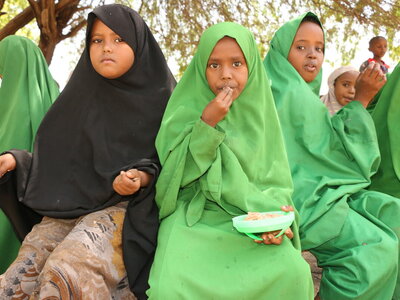Kenya
- 38.6%
- of people live below the poverty lines
- 29%
- of children in rural areas are stunted
- 52.4 million
- population
Kenya is on the frontlines of the climate crisis. Severe droughts are often followed by heavy rain and flooding – forcing thousands of people from their homes, destroying livelihoods and degrading land.
Agriculture remains the main economic driver but is very vulnerable to these climate shocks, with arid and semi-arid regions making up 80 percent of the country’s land. Rural communities that depend on crops – 95 percent of which are rain-fed – and livestock are particularly exposed.
Inefficiencies in food systems – the networks that are needed to produce and process food, and ensure it reaches consumers – lead to high prices and insufficient market supplies. This limits the availability of, and access to, food.
Rapid population growth – at a rate of 2.9 percent a year – is another factor affecting food security. Families headed by women are more likely to be food insecure than those headed by men.
What the World Food Programme is doing in Kenya
-
Support to refugees
-
WFP is working with UNHCR and the government's Department of Refugee Services on a Differentiated Assistance framework that tailors support to the specific needs of refugees. Up to this point, WFP has been providing refugees with unconditional food and nutrition assistance through cash and food transfers, while increasing self-reliance through approaches including livelihoods diversification.
-
Resilience building
-
Capacity strengthening
-
Service delivery
Kenya news releases
Go to pagePartners and donors
For questions or feedback on WFP’s assistance:
- Call for free: +254 800-722446
- SMS: +254 707-722446
- Email: kenya.feedback@wfp.org
Find out more about the state of food security in Kenya
Visit the food security analysis pageOperations in Kenya
Contacts
Office
United Nations Complex, Gigiri P.O. Box 44482 – 00100
Nairobi
Kenya







